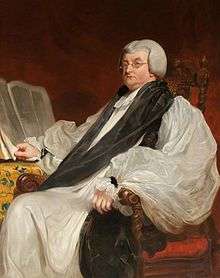Thomas Burgess (bishop)
| The Right Reverend Thomas Burgess | |
|---|---|
| Bishop of Salisbury | |
 | |
| Church | Church of England |
| Diocese | Diocese of London |
| Installed | 1803 |
| Predecessor | John Fisher |
| Successor | Edward Denison |
| Personal details | |
| Born |
18 November 1756 Odiham |
| Died | 19 February 1837 (aged 80) |
| Nationality | British |
| Denomination | Anglican |
| Education |
Robert May's School Winchester College |
| Alma mater | Corpus Christi College, Oxford |
Thomas Burgess (18 November 1756 – 19 February 1837) was an English author, philosopher, Bishop of St David's and Bishop of Salisbury.
Life
He was born at Odiham in Hampshire and educated at Robert May's School, Odiham, Winchester College, and at Corpus Christi College, Oxford. Before graduating, he edited a reprint of John Burton's Pentalogia. In 1781 he brought out an annotated edition of Richard Dawes's Miscellaneci Critica (reprinted, Leipzig, 1800). In 1783 he became a fellow of his college, and in 1785 was appointed chaplain to Shute Barrington, bishop of Salisbury.[1] He moved with Barrington to Durham on the latter's appointment as bishop there in 1791, where he obtained a prebendal stall, holding in turn the 9th (1791-92),[2] 6th (1792-1820)[3] and 2nd (1820-1825) stalls.[4]
In 1788 he published his Considerations on the Abolition of Slavery, in which he advocated the principle of gradual emancipation. In 1791 he accompanied Barrington to Durham, where he did evangelistic work among the poorer classes. In 1803 he was appointed to the vacant bishopric of St David's, which he held for over twenty years, in commendam with his prebendal stall in Durham. He founded the Society for Promoting Christian Knowledge in the diocese, and also St David's College (now the University of Wales, Lampeter), which he endowed,[1] and to which his library was donated after his death.
In 1820 he was appointed first president of the recently founded Royal Society of Literature; and five years later he was promoted to the see of Salisbury, also resigning his stall in Durham. At Salisbury at St David's, he founded a Church Union Society for the assistance of infirm and distressed clergymen. He opposed both Unitarianism and Catholic Emancipation.[1]
Thomas Burgess was a founding member of the Odiham Agricultural Society and was instrumental in establishing the Royal Veterinary Society.
He died on 19 February 1837, and was buried at Salisbury on 27 February.[5]
Works
A list of his works, which are very numerous, will be found in his biography by John Scandrett Harford (2nd ed, 1841). In addition to those already referred to may be mentioned his Essay on the Study of Antiquities, The First Principles of Christian Knowledge; Reflections on the Controversial Writings of Dr Priestley, Emendationes in Suidam et Hesychium et alios Lexicographos Graecos; The Bible, and nothing but the Bible, the Religion of the Church of England.[1]
Notes
- 1 2 3 4
 One or more of the preceding sentences incorporates text from a publication now in the public domain: Chisholm, Hugh, ed. (1911). "Burgess, Thomas". Encyclopædia Britannica. 4 (11th ed.). Cambridge University Press. p. 814.
One or more of the preceding sentences incorporates text from a publication now in the public domain: Chisholm, Hugh, ed. (1911). "Burgess, Thomas". Encyclopædia Britannica. 4 (11th ed.). Cambridge University Press. p. 814. - ↑ Canons of Durham: Ninth prebend. Fasti Ecclesiae Anglicanae. 11. Institute of Historical Research. 2004. pp. 104–106 – via British History Online.
- ↑ Canons of Durham: Sixth prebend. Fasti Ecclesiae Anglicanae. 11. Institute of Historical Research. 2004. pp. 97–99 – via British History Online.
- ↑ Canons of Durham: Second prebend. Fasti Ecclesiae Anglicanae. 11. Institute of Historical Research. 2004. pp. 88–90 – via British History Online.
- ↑ Tout 1886.
References
- John Scandrett Harford, The life of Thomas Burgess, D.D., F.R.S., F.A.S. &c. &c. &c. late Lord Bishop of Salisbury, Orme, Brown, Green and Longmans, London.
- D T W Price, Yr Esgob Burgess a Choleg Llanbedr: Bishop Burgess and Lampeter College, University of Wales Press, Cardiff (ISBN 0-7083-0965-8)
 Tout, Thomas Frederick (1886). "Burgess, Thomas (1756-1837)". In Stephen, Leslie. Dictionary of National Biography. 7. London: Smith, Elder & Co.
Tout, Thomas Frederick (1886). "Burgess, Thomas (1756-1837)". In Stephen, Leslie. Dictionary of National Biography. 7. London: Smith, Elder & Co.
| Church of England titles | ||
|---|---|---|
| Preceded by Lord George Murray |
Bishop of St David's 1803–1825 |
Succeeded by John Jenkinson |
| Preceded by John Fisher |
Bishop of Salisbury 1825–1837 |
Succeeded by Edward Denison |